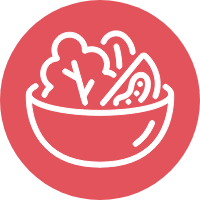- HealthBites for Diabetes Resource Hub
- Calcium: An Essential Nutrient For Your Bone Health
- How To Manage Your Cholesterol Levels
- How To Prevent And Treat Constipation
- How To Manage Your Diet and Health When You Have Diabetes
- How To Manage Diarrhea
- High Blood Pressure and Food Choices
- Everything You Need To Know About Probiotics
- What You Need To Know About Vitamin B12
- How To Manage Gas and Bloating
- Heartburn Relief
- Solutions To Manage Dry Mouth
- Celiac Disease: Gluten-Free Diet
- Osteoporosis Prevention: Keeping Your Bones Healthy
- The Importance of Vitamin C
- What You Need to Know About Folate
- What You Need To Know About Iron
- What You Need To Know About Potassium
- What You Need To Know About Magnesium
- What You Need To Know About Zinc
- What You Need To Know About Vitamin K
- All About Vitamin D
The Importance of Vitamin C

Vitamin C, also known as ascorbic acid, is essential for the body to function properly. It's important for growth and repair of bones, teeth, skin and other tissues. It also helps prevent cell damage and protects you from infections.
Why Do We Need Vitamin C?
Vitamin C has several functions in the body including:
- Promotes the absorption of iron from plant foods
- Acts as an antioxidant
- Keeps your gums healthy
- Helps to form and repair blood, bones and other tissues
A severe deficiency of vitamin C is extremely uncommon in North America, but a few hundred years ago, it was the main cause of scurvy. Too little vitamin C may result in bleeding gums, poor healing of wounds, loose teeth, joint pain and infections.
Our bodies don't store large amounts of vitamin C. Any extra amount is lost through the urine. Therefore, it's important to eat a diet rich in vitamin C every day.
Vitamin C Food Sources
The best food sources of vitamin C are vegetables and fruit. The amount of vitamin C in a food is affected by the way it is cooked. Vitamin C is lost in cooking water and during long storage times. You can maximize your vitamin C intake by eating fresh fruits and vegetables as soon as possible or preserve vitamin C by cooking food in very little water (i.e. microwaving or steaming).
Most people can get enough vitamin C by eating a healthy diet. The recommended nutritional intake for adults aged 19 and older is 90 mg/day for men, and 75 mg/day for women.
See the table below for the vitamin C content of some common foods.

| Food Group | Food | Serving size | Vitamin C (mg) |
|---|---|---|---|
| Vegetables and Fruit | |||
| Yellow pepper, raw | 125 mL (½ cup) | 144 | |
| Guava | 1 fruit | 126 | |
| Red pepper, raw | 125 mL (½ cup) | 101 | |
| Papaya | ½ fruit | 93 | |
| Kiwifruit | 1 large | 84 | |
| Orange | 1 medium | 70 | |
| Broccoli, cooked | 125 mL (½ cup) | 54 | |
| Orange juice | 125 mL (½ cup) | 53 | |
| Brussels sprouts, cooked | 125 mL (4 sprouts) | 52 | |
| Strawberries | 125 mL (½ cup) | 52 | |
| Grapefruit | ½ fruit | 46 | |
| Cabbage, red, raw | 250 mL (1 cup) | 42 | |
| Pineapple | 125 ml (½ cup) | 42 | |
| Snow peas, cooked | 125 ml (½ cup) | 41 | |
| Mango | ½ fruit | 38 | |
| Clementine | 1 fruit | 36 | |
| Cantaloupe | 125 mL (½ cup) | 31 | |
| Cauliflower, cooked | 125 mL (½ cup) | 29 | |
| Kale, cooked | 125 mL (½ cup) | 28 | |
| Bok choy, cooked | 125 mL (½ cup) | 23 | |
| Sweet potato, with skin, cooked | 1 medium | 22 | |
| Potato, with skin, cooked | 1 medium | 22 | |
| Raspberries | 125 mL (½ cup) | 17 | |
| Tomato, raw | 1 medium | 17 | |
| Honeydew | 125 mL (½ cup) | 16 | |
| Cranberry juice | 125 mL (½ cup) | 12 | |
| Grain Products | This food group contains very little of this nutrient | ||
| Milk and Alternatives | This food group contains very little of this nutrient | ||
| Meat and Alternatives | |||
| Chestnuts (Japanese, Chinese) | 60 mL (¼ cup) | 24 | |
| Liver (pork, chicken, turkey) , cooked | 75 g (2.5 oz) | 19 | |
| Clams, cooked | 75 g (2.5 oz) | 17 | |
The information in this resource is for general information purposes only and is not intended to replace informed medical advice. Consume foods according to any dietary guidelines you have been provided from a health care professional. Metro Ontario Pharmacies Limited assumes no legal liability for the accuracy, completeness or usefulness of the information.










